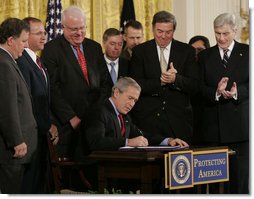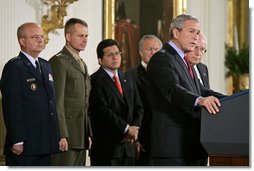
- Afghanistan
- Africa
- Budget Management
- Defense
- Economy
- Education
- Energy
- Environment
- Global Diplomacy
- Health Care
- Homeland Security
- Immigration
- International Trade
- Iraq
- Judicial Nominations
- Middle East
- National Security
- Veterans
|
Home >
News & Policies >
October 2006
|
For Immediate Release
Office of the Press Secretary
October 17, 2006
President Bush Signs Military Commissions Act of 2006
The East Room
![]() Fact Sheet: The Military Commissions Act of 2006
Fact Sheet: The Military Commissions Act of 2006
![]() In Focus: National Security
In Focus: National Security
9:35 A.M. EDT
THE PRESIDENT: Welcome to the White House on an historic day. It is a rare occasion when a President can sign a bill he knows will save American lives. I have that privilege this morning.
The Military Commissions Act of 2006 is one of the most important pieces of legislation in the war on terror. This bill will allow the Central Intelligence Agency to continue its program for questioning key terrorist leaders and operatives like Khalid Sheikh Mohammed, the man believed to be the mastermind of the September the 11th, 2001 attacks on our country. This program has been one of the most successful intelligence efforts in American history. It has helped prevent attacks on our country. And the bill I sign today will ensure that we can continue using this vital tool to protect the American people for years to come. The Military Commissions Act will also allow us to prosecute captured terrorists for war crimes through a full and fair trial.
 Last month, on the fifth anniversary of 9/11, I stood with Americans who
lost family members in New York and Washington and Pennsylvania. I
listened to their stories of loved ones they still miss. I told them
America would never forget their loss. Today I can tell them something
else: With the bill I'm about to sign, the men our intelligence officials
believe orchestrated the murder of nearly 3,000 innocent people will face
justice.
Last month, on the fifth anniversary of 9/11, I stood with Americans who
lost family members in New York and Washington and Pennsylvania. I
listened to their stories of loved ones they still miss. I told them
America would never forget their loss. Today I can tell them something
else: With the bill I'm about to sign, the men our intelligence officials
believe orchestrated the murder of nearly 3,000 innocent people will face
justice.
I want to thank the Vice President for joining me today. Mr. Vice President, appreciate you. Secretary Don Rumsfeld, I appreciate your service to our country. I want to thank Attorney General Al Gonzales; General Mike Hayden, Director of the Central Intelligence Agency; General Pete Pace, Chairman of the Joint Chiefs of Staff.
I appreciate very much Senator John Warner, Chairman of the Senate Armed Services Committee, and Congressman Duncan Hunter, Chairman of the House Armed Services Committee, for joining us today. I want to thank both of these men for their leadership. I appreciate Senator Lindsey Graham, from South Carolina, joining us; Congressman Jim Sensenbrenner, Chairman of the House Judiciary Committee; Congressman Steve Buyer, of Indiana; Congressman Chris Cannon, of Utah. Thank you all for coming.
The bill I sign today helps secure this country, and it sends a clear message: This nation is patient and decent and fair, and we will never back down from the threats to our freedom.
One of the terrorists believed to have planned the 9/11 attacks said he hoped the attacks would be the beginning of the end of America. He didn't get his wish. We are as determined today as we were on the morning of September the 12th, 2001. We'll meet our obligation to protect our people, and no matter how long it takes, justice will be done.
 When I proposed this legislation, I explained that I would have one test
for the bill Congress produced: Will it allow the CIA program to continue?
This bill meets that test. It allows for the clarity our intelligence
professionals need to continue questioning terrorists and saving lives.
This bill provides legal protections that ensure our military and
intelligence personnel will not have to fear lawsuits filed by terrorists
simply for doing their jobs.
When I proposed this legislation, I explained that I would have one test
for the bill Congress produced: Will it allow the CIA program to continue?
This bill meets that test. It allows for the clarity our intelligence
professionals need to continue questioning terrorists and saving lives.
This bill provides legal protections that ensure our military and
intelligence personnel will not have to fear lawsuits filed by terrorists
simply for doing their jobs.
This bill spells out specific, recognizable offenses that would be considered crimes in the handling of detainees so that our men and women who question captured terrorists can perform their duties to the fullest extent of the law. And this bill complies with both the spirit and the letter of our international obligations. As I've said before, the United States does not torture. It's against our laws and it's against our values.
By allowing the CIA program to go forward, this bill is preserving a tool that has saved American lives. The CIA program helped us gain vital intelligence from Khalid Sheikh Mohammed and Ramzi Binalshibh, two of the men believed to have helped plan and facilitate the 9/11 attacks. The CIA program helped break up a cell of 17 southeastern Asian terrorist operatives who were being groomed for attacks inside the United States. The CIA program helped us uncover key operatives in al Qaeda's biological weapons program, including a cell developing anthrax to be used in terrorist attacks.
The CIA program helped us identify terrorists who were sent to case targets inside the United States, including financial buildings in major cities on the East Coast. And the CIA program helped us stop the planned strike on U.S. Marines in Djibouti, a planned attack on the U.S. consulate in Karachi, and a plot to hijack airplanes and fly them into Heathrow Airport and Canary Wharf in London.
Altogether, information from terrorists in CIA custody has played a role in the capture or questioning of nearly every senior al Qaeda member or associate detained by the United States and its allies since this program began. Put simply, this program has been one of the most vital tools in our war against the terrorists. It's been invaluable both to America and our allies. Were it not for this program, our intelligence community believes that al Qaeda and its allies would have succeeded in launching another attack against the American homeland. By allowing our intelligence professionals to continue this vital program, this bill will save American lives. And I look forward to signing it into law.
The bill I'm about to sign also provides a way to deliver justice to the terrorists we have captured. In the months after 9/11, I authorized a system of military commissions to try foreign terrorists accused of war crimes. These commissions were similar to those used for trying enemy combatants in the Revolutionary War and the Civil War and World War II. Yet the legality of the system I established was challenged in the court, and the Supreme Court ruled that the military commissions needed to be explicitly authorized by the United States Congress.
And so I asked Congress for that authority, and they have provided it. With the Military Commission Act, the legislative and executive branches have agreed on a system that meets our national security needs. These military commissions will provide a fair trial, in which the accused are presumed innocent, have access to an attorney, and can hear all the evidence against them. These military commissions are lawful, they are fair, and they are necessary.
When I sign this bill into law, we will use these commissions to bring justice to the men believed to have planned the attacks of September the 11th, 2001. We'll also seek to prosecute those believed responsible for the attack on the USS Cole, which killed 17 American sailors six years ago last week. We will seek to prosecute an operative believed to have been involved in the bombings of the American embassies in Kenya and Tanzania, which killed more than 200 innocent people and wounded 5,000 more. With our actions, we will send a clear message to those who kill Americans: We will find you and we will bring you to justice.
Over the past few months the debate over this bill has been heated, and the questions raised can seem complex. Yet, with the distance of history, the questions will be narrowed and few: Did this generation of Americans take the threat seriously, and did we do what it takes to defeat that threat? Every member of Congress who voted for this bill has helped our nation rise to the task that history has given us. Some voted to support this bill even when the majority of their party voted the other way. I thank the legislators who brought this bill to my desk for their conviction, for their vision, and for their resolve.
There is nothing we can do to bring back the men and women lost on September 11th, 2001. Yet we'll always honor their memory and we will never forget the way they were taken from us. This nation will call evil by its name. We will answer brutal murder with patient justice. Those who kill the innocent will be held to account.
With this bill, America reaffirms our determination to win the war on terror. The passage of time will not dull our memory or sap our nerve. We will fight this war with confidence and with clear purpose. We will protect our country and our people. We will work with our friends and allies across the world to defend our way of life. We will leave behind a freer, safer and more peaceful world for those who follow us.
And now, in memory of the victims of September the 11th, it is my honor to sign the Military Commissions Act of 2006 into law. (Applause.)
(The bill is signed.)
END 9:47 A.M. EDT


